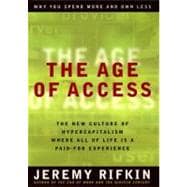Imagine a world where virtually every activity outside the confines of family relations is a paid-for experience -- a world where traditional reciprocal obligations and expectations are replaced by contractual relations in the form of paid memberships, subscriptions, admissions charges, retainers, and fees.
For the first time in modern history, Rifkin argues, ownership of physical property is seen as an albatross, and intangible ideas and expertise are the chief generators of wealth. This dramatic shift affects corporations as much as consumers: the world's major companies are quickly shedding property









